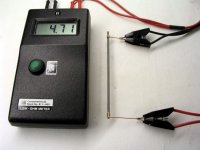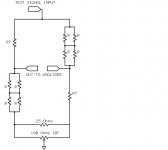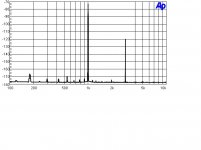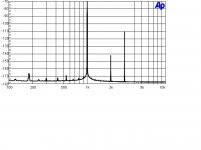I didn't read the entire thread, but in the last several pages I gathered maybe one possible useful bit of info on resistors and SQ. However, it was fun to follow for a while to see who might win another futile argument, still undecided... Maybe we should take a poll?
Lucky you
Have a look around, Jneutron has done a few non inductive designs I believe.
Does the minute amount of inductance have that much effect? Personally because of the designs I work on I think SMD is much better, you can minimise the circuit area greatly, thus reducing loop areas, this is especially critical for any feedback loops. The devices have far less parasitic inductance.
Its just harder to tweak and play about with particular devices, so does have its disadvantages for those who like to do this.
As mentioned earlier here's one note from Analog Devices that is worth a read, no mention of rectification (sorry). Again it shows some interesting effects layout can have, and how you avoid certain problems such as heating etc. These effects would be better discussed IMO instead of resistors rectification, as they could have a negative effect on the circuit.
Analog Devices : Rarely Asked Questions (RAQs) : Resistors in Analog Circuitry
Does the minute amount of inductance have that much effect? Personally because of the designs I work on I think SMD is much better, you can minimise the circuit area greatly, thus reducing loop areas, this is especially critical for any feedback loops. The devices have far less parasitic inductance.
Its just harder to tweak and play about with particular devices, so does have its disadvantages for those who like to do this.
As mentioned earlier here's one note from Analog Devices that is worth a read, no mention of rectification (sorry). Again it shows some interesting effects layout can have, and how you avoid certain problems such as heating etc. These effects would be better discussed IMO instead of resistors rectification, as they could have a negative effect on the circuit.
Analog Devices : Rarely Asked Questions (RAQs) : Resistors in Analog Circuitry
Lucky youI haven't seen any, somewhere in my documentation I have app notes from either linear or analogue that put forth the benefits of various resistor types and their possible effect on sensitive analogue circuitry... I will post a link if I can find it, nothing major just the same as been discussed here... apart from resistors rectifying signals and microphony they aren't mentioned.
Bob Pease's treatment in his Analog Troubleshooting book is also very worthwhile. Also no mention of rectification and microphony.
I don't think you will have any difficulty getting SY to "admit" that resistors have parasitic characteristics. Their inductance and capacitance are well known and measurable. Clearly they can alter electrical waveforms, of sufficiently high frequency. Unlikely to have much effect at the low frequencies of audio, and even then any effect will be that of a filter.terrences said:I've been spending the last few pages trying to get SY to admit they exist at all. If he will admit these parasitic characteristics can alter electrical waveforms we can then bring the discussion to its conclusion about their audibility and isn't that the point of all this?
The fact that filters alter waveforms is hardly an earth-shattering discovery.
Do resistors have other less benign parasitics, such as diodes? Unless faulty, probably not. If they did, resistors would not be used in more demanding applications.
There is one resistor problem which affects audio more than some other electronic applications: excess noise, mainly at low frequencies. This has been well known for decades, yet the worst resistors in this regard (carbon composition) are popular with some audiophiles! My conclusion is that some people prefer noise and distortion with their music, and describe linear low-noise circuitry as "sterile", "bland", "unmusical". That would be fine as a personal preference, but they usually go on to claim that their favoured distortion is somehow less distorted and have to posit some unknown unmeasured distortion in linear systems. Strangely, this alleged distortion does not appear in the output signal and cannot be heard with ears alone. Even more strangely, this alleged distortion often seems to be described in terms which seem related to other properties of the component e.g. metal film resistors are said to apply a 'metallic sheen' to sound, silver cables make the sound 'bright'. You don't need to be a clinical psychologist to guess what may be going on here!
If we are going to discuss resistor parasitics then we must also discuss PCB parasitics, that far out way the resistor ones... Again though those are invisible to many, and to be quite honest as DF96 has mentioned for low frequency stuff you don't have to worry about them, its when you start doing DDR memory layout and similar or RF you start looking at these... But to take a resistor in isolation regarding parasitics is only a part of the story.
There is one resistor problem which affects audio more than some other electronic applications: excess noise, mainly at low frequencies.
Of course, as you well know, that's also dependent on application (position in the circuit, especially). Another is voltage coefficient, again application dependent. Basic engineering, but as you also well know, that can't be taught in ten lines.
Ha! At last - you admit it: resistors are not perfect so they must affect the sound so the true believers were right all along.SY said:Another is voltage coefficient, again application dependent.
Ha! At last - you admit it: resistors are not perfect so they must affect the sound so the true believers were right all along.
Yes, it's always embarrassing to be forced to retract things I never said. This is something with which you are also all too familiar.
Generally unimportant in audio unless a resistor's wattage rating is too low for the application. It's a DC phenomenon.
Then what was SY trying to achieve wasting three pages of bandwidth and content when he could have stated his position clearly in one post? His last post above clearly concurs with my stated position in this thread so was this odd behavior an attempt at humor? Am I wrong to expect moderators to have a more serious comportment?DF96 said:I don't think you will have any difficulty getting SY to "admit" that resistors have parasitic characteristics.
People learn by getting answers to questions and build knowledge by assessing the replies they receive. The questions posed to you were quite easy to answer in less than ten lines and did not require a thesis or compendium of engineering concepts. It is dishonest to imply that it did, the same way it is to infer that you were 'teaching' anyone. I am really disappointed making your acquaintance and expected much better from someone with the moniker of moderator.SY said:Basic engineering, but as you also well know, that can't be taught in ten lines.
Attach are my distortion measurements on two carbon film resistors. The fundamental has been suppressed a bit by the measurement technique. (54 db.) First image test set up.
As you can see there is dominant odd order harmonic distortion as you would expect from thermal variations in resistance. Rectification would create even order harmonics. (Although there are also other mechanisms.)
The really bad example shown in the third image may indeed have rectification issues! But probably not as the rest of the even order harmonic structure I would expect is missing.
The base spreading on the third image is from an increase in noise level.
Now there is at least one well regarded amplifier that uses a 1/4 W audiophile carbon film resistor in the feedback network that does increase the second harmonic distortion of the amplifier to where it is the dominant distortion and masks pretty much so any other distortions present.
Some folks like added harmonic distortion, that is of course a personal preference.
As you can see there is dominant odd order harmonic distortion as you would expect from thermal variations in resistance. Rectification would create even order harmonics. (Although there are also other mechanisms.)
The really bad example shown in the third image may indeed have rectification issues! But probably not as the rest of the even order harmonic structure I would expect is missing.
The base spreading on the third image is from an increase in noise level.
Now there is at least one well regarded amplifier that uses a 1/4 W audiophile carbon film resistor in the feedback network that does increase the second harmonic distortion of the amplifier to where it is the dominant distortion and masks pretty much so any other distortions present.
Some folks like added harmonic distortion, that is of course a personal preference.
Attachments
(replying to post 673 by terrences)
The forum rules do not prohibit off-duty moderators from having and using a sense of humour. They are human, after all; well, almost.
I have sometimes fallen foul of SY's unfortunate habit of saying exactly what he means and assuming that others do the same. This is most unhelpful in a scientist as it confuses everyone. Much better to say something different from what is meant and expect everyone to read between the lines to discern what was really meant, as others do. Or not mean anything at all, as some appear to do.
I think you need to forget that SY is a mod. In this discussion he is not wearing his Hat. Instead, go back to the point of difference and try to understand exactly what you said and exactly what he said, and why he believes they were different. Then you can have a meaningful argument. Or just forget it and move on.
The forum rules do not prohibit off-duty moderators from having and using a sense of humour. They are human, after all; well, almost.
I have sometimes fallen foul of SY's unfortunate habit of saying exactly what he means and assuming that others do the same. This is most unhelpful in a scientist as it confuses everyone. Much better to say something different from what is meant and expect everyone to read between the lines to discern what was really meant, as others do. Or not mean anything at all, as some appear to do.
I think you need to forget that SY is a mod. In this discussion he is not wearing his Hat. Instead, go back to the point of difference and try to understand exactly what you said and exactly what he said, and why he believes they were different. Then you can have a meaningful argument. Or just forget it and move on.
Last edited:
it is also an AC phenomenon.Generally unimportant in audio unless a resistor's wattage rating is too low for the application. It's a DC phenomenon.
Very measurable at LF and becoming less measurable at higher frequencies.
It also shows in distortion measurements when other distortions are near or into an already low noise floor.
Last edited:
Attach are my distortion measurements on two carbon film resistors. The fundamental has been suppressed a bit by the measurement technique. (54 db.) First image test set up.
As you can see there is dominant odd order harmonic distortion as you would expect from thermal variations in resistance. Rectification would create even order harmonics. (Although there are also other mechanisms.)
The really bad example shown in the third image may indeed have rectification issues! But probably not as the rest of the even order harmonic structure I would expect is missing.
The base spreading on the third image is from an increase in noise level.
Now there is at least one well regarded amplifier that uses a 1/4 W audiophile carbon film resistor in the feedback network that does increase the second harmonic distortion of the amplifier to where it is the dominant distortion and masks pretty much so any other distortions present.
Some folks like added harmonic distortion, that is of course a personal preference.
Wheres the rest of the info? Voltages, resistances, power rating.
In a steady state ( sine wave, no amplitude variation ) there is no temp. coefficient distortion, the resistor temps are constant. That might be voltage coefficient, but in a divider the two resistors track together so if the resistors are the same value, no distortion.
The one place voltage coefficient may be a problem is in power amp feedback. Now I'm reapeting my self. (A few pages ago).
Generally unimportant in audio unless a resistor's wattage rating is too low for the application. It's a DC phenomenon.
it is also an AC phenomenon.
Very measurable at LF and becoming less measurable at higher frequencies.
I bolded the relevant portion of my post to clarify for you.
- Status
- Not open for further replies.
- Home
- Member Areas
- The Lounge
- Resistor Sound Quality?



